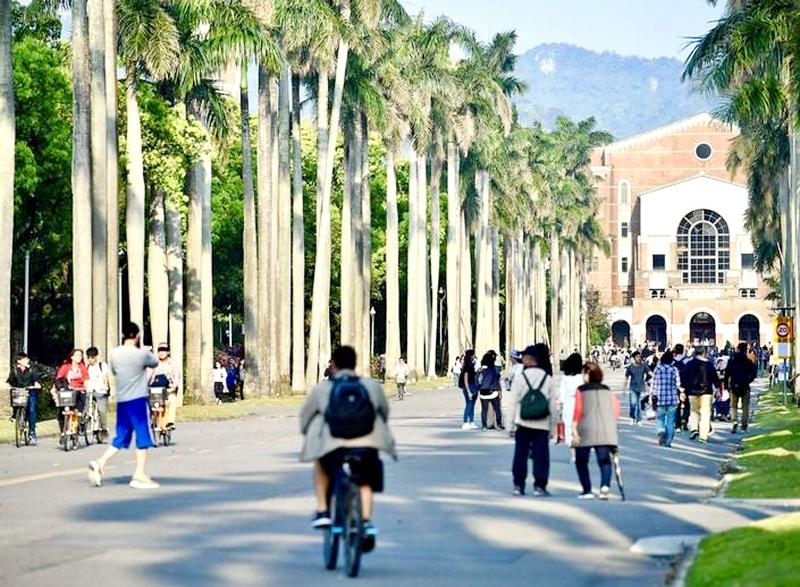Harvard University is to relocate its summer Mandarin program from Beijing to National Taiwan University (NTU) starting next year, a student publication reported on Thursday last week.
Run at Beijing Language and Culture University (BLCU) since 2004, the Harvard Beijing Academy is to become the Harvard Taipei Academy once it moves to Taiwan, Crimson magazine reported.
Program director Jennifer Liu (劉力嘉) attributed the decision to a “perceived lack of friendliness” from the Chinese university, potentially due to shifting political winds.

Photo: Wu Po-hsuan, Taipei Times
Liu told the magazine that BLCU in recent years had failed to provide a single dorm for the students or separate accommodation of equal quality.
It also banned the program’s Fourth of July celebration for students and faculty in 2019 amid a souring of attitudes toward US institutions since Chinese President Xi Jinping’s (習近平) rise to power, she said.
However, Harvard Center Shanghai chair William Kirby maintained that the move was purely for logistical reasons, telling Crimson that Harvard has overall been forming closer connections with China.
“This is not a time in which this university is retreating from its engagement with China — it’s actually seeking every way possible to deepen it,” the magazine quoted Kirby as saying.
Kirby cited collaborations between Chinese academics and the Fairbank Center, the Harvard Kennedy School Asia Fellows Program and the Harvard Center Shanghai, which has been holding in-person events even while the rest of Harvard has been shut down due to the COVID-19 pandemic.
NTU said that the program was scheduled to begin in the summer last year following discussions that started in 2019, but the COVID-19 pandemic delayed the opening to next year.
Hopefully, the free academic atmosphere at NTU would provide a solid foundation for Harvard University students to study Mandarin, while NTU students could develop a more international perspective through engagement with their US peers, NTU added.
As an official Harvard Summer School program, the eight-week course is to be taught by Harvard faculty from June to August next year.
The Harvard Taipei Academy Web site promises the same academic rigor as the Beijing program, with the opportunity for immersion in “the dynamic and diverse society and culture of Taiwan — a unique island where tradition and modernity are intertwined.”
Five hours of classes for about 60 students are to be offered daily from Monday to Thursday, with exams every Friday.
The program also promises weekend excursions and cultural extracurricular activities such as taichi and calligraphy, as well as modern accommodation just off campus.
National Taiwan Normal University Department of Chinese as a Second Language chair Tsai Ya-hsun (蔡雅勳) said that Mandarin education is excellent on both sides of the Taiwan Strait, but China has eclipsed Taiwan as a study destination since the 1980s.
However, with the worsening of relations between the US and China, and the former’s labeling of Confucius Institutes as foreign missions, Taiwan is once again becoming an attractive study location, she said, adding that she believes the free environment in Taiwan could be advantageous to language learners.
Additional reporting by Wu Po-hsuan

SECURITY: As China is ‘reshaping’ Hong Kong’s population, Taiwan must raise the eligibility threshold for applications from Hong Kongers, Chiu Chui-cheng said When Hong Kong and Macau citizens apply for residency in Taiwan, it would be under a new category that includes a “national security observation period,” Mainland Affairs Council (MAC) Minister Chiu Chui-cheng (邱垂正) said yesterday. President William Lai (賴清德) on March 13 announced 17 strategies to counter China’s aggression toward Taiwan, including incorporating national security considerations into the review process for residency applications from Hong Kong and Macau citizens. The situation in Hong Kong is constantly changing, Chiu said to media yesterday on the sidelines of the Taipei Technology Run hosted by the Taipei Neihu Technology Park Development Association. With

CARROT AND STICK: While unrelenting in its military threats, China attracted nearly 40,000 Taiwanese to over 400 business events last year Nearly 40,000 Taiwanese last year joined industry events in China, such as conferences and trade fairs, supported by the Chinese government, a study showed yesterday, as Beijing ramps up a charm offensive toward Taipei alongside military pressure. China has long taken a carrot-and-stick approach to Taiwan, threatening it with the prospect of military action while reaching out to those it believes are amenable to Beijing’s point of view. Taiwanese security officials are wary of what they see as Beijing’s influence campaigns to sway public opinion after Taipei and Beijing gradually resumed travel links halted by the COVID-19 pandemic, but the scale of

A US Marine Corps regiment equipped with Naval Strike Missiles (NSM) is set to participate in the upcoming Balikatan 25 exercise in the Luzon Strait, marking the system’s first-ever deployment in the Philippines. US and Philippine officials have separately confirmed that the Navy Marine Expeditionary Ship Interdiction System (NMESIS) — the mobile launch platform for the Naval Strike Missile — would take part in the joint exercise. The missiles are being deployed to “a strategic first island chain chokepoint” in the waters between Taiwan proper and the Philippines, US-based Naval News reported. “The Luzon Strait and Bashi Channel represent a critical access

Pope Francis is be laid to rest on Saturday after lying in state for three days in St Peter’s Basilica, where the faithful are expected to flock to pay their respects to history’s first Latin American pontiff. The cardinals met yesterday in the Vatican’s synod hall to chart the next steps before a conclave begins to choose Francis’ successor, as condolences poured in from around the world. According to current norms, the conclave must begin between May 5 and 10. The cardinals set the funeral for Saturday at 10am in St Peter’s Square, to be celebrated by the dean of the College